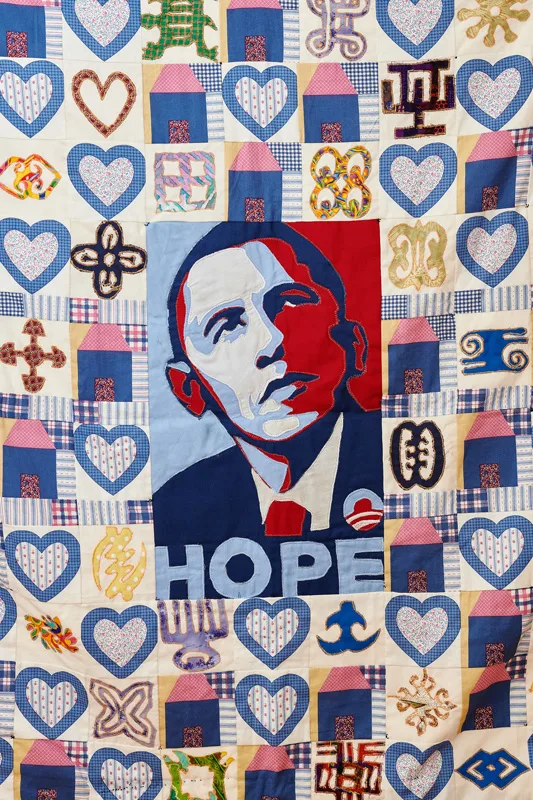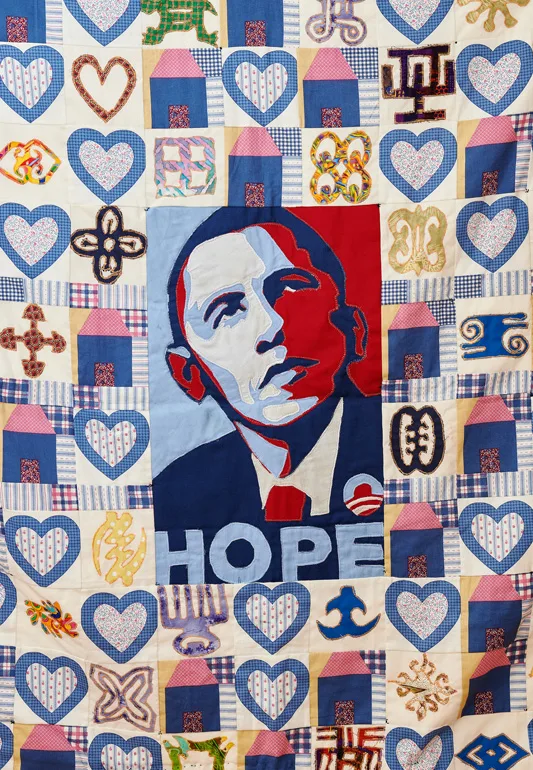
Mariposa Museum and World Cultural Center in Oak Bluffs recently opened an exhibit called “Stitching Time: The Social Justice Collaborative Quilts Project.” This show highlights 20 quilts created by men who are incarcerated in the Louisiana State Penitentiary, also known as Angola Prison, named after a former slave plantation. These works of art, and accompanying recorded interviews, tell the story of a unique inside-outside quilt collaboration. The exhibit focuses on the people often forgotten by society when discussing the history of the U.S. criminal justice system.
“We opened in Oak Bluffs in 2019, with a Women of Color Quilting Network show, ‘And Still We Rise: Race, Culture, and Visual Conversation,’” Mariposa executive director Karla Hostetler said. These artists told an abundance of rich stories about African American history through fiber arts and quilts. “About 5,000 people came through to see that show. Now, here we are in 2023, with another quilt show, this time by men.”
Mariposa Museum and World Cultural Center has two locations: Peterborough, N.H., and Oak Bluffs. The New Hampshire location has been running for 20 years, originally focusing on folk art. When Hostetler came on board, the museum began exploring broader multiculturalism in the U.S. through visual arts, programming, and multimedia work. “It gained a lot of traction, and we started thinking about how we could create a regional and national platform. Oak Bluffs is such an important part of African American history. It seemed like a perfect place to open our second location,” Hostetler said.
Hostetler said they are a museum of human understanding, exploring American history and African diaspora experiences through art, storytelling, and education. The Collaborative Quilts Project does this and more. “A lot of attention has been focused on the incarceration of Black men. These quilts let us connect in a tactile and direct way with the men who are currently in prison,” she said.
The co-founders of the Social Justice Collaborative Quilts Project are Maureen Kelleher and Kenya Baleech Alkebu, also known as K. The goals of the project are to teach the world about the prison hospice program, create a bridge for communication between inside quilters and free quilters, give voice to the quilters’ political consciousness, and more.
Kelleher, an artist, activist, and private investigator, became interested in prisoners’ rights, and worked on capital crimes and felony cases. She was directly responsible for finding witnesses to cold death-row cases, and played a significant role in discovering new evidence that helped exonerate three men on death row. Still a private investigator, Kelleher works at Legal Aid Society NYC.
Artist Kenya Baleech Alkebu has been in Angola Prison for 44 years. Kelleher was able to provide notes from Alkebu for this article. “For the first 12 years no one looked for me, and no one looked at me. Then I met Maureen 32 years ago. We became pen pals,” Alkebu said. Alkebu has been quilting for more than 20 years inside. He also writes and mentors fellow inmates who struggle with addiction. Alkebu worked in the prison law library for decades, and volunteered for eight years in the prison’s hospice program, sitting with dying inmates, and helping with burials and funeral programs when families didn’t claim the inmate’s body.
Though Alkebu and Kelleher were already creating quilts on their own, their partnership wasn’t actualized until 2012. “K told me about the quilts the lifer hospice volunteers had made, how he learned to make quilts, and that the quilts were a way for the men to raise money for their hospice project. By selling their quilts, they were able to buy clothing and other necessities for dying men, sometimes even paying for a family member to visit to say a final farewell to their loved one. I felt the world must see the quilts and know their stories, and K agreed,” Kelleher said.
“The Social Justice Collaborative Quilts Project was one of those strokes of God-inspired genius between us,” Alkebu said. “We built a team based on respect and communication. Maureen and I work against the current trend to silence, hide, and treat the imprisoned with disdain and relegate them to less-than status. The beauty of our creativity, the quilts, is a testament to love, and so much more. We couldn’t have done this without each other. Two people, one soul. Such a bond makes my world a better place.”
The project grew wings of its own, and currently there are a handful of quilters who have created more than 50 socially conscious, stunning quilts, and have exhibited in six shows. Alkebu’s quilt, “Red, White & Baldwin,” is also the cover art for Vol. 8, October 22, of James Baldwin Review, an annual journal of peer‐reviewed critical and creative nonfiction on the life, writings, and legacy of James Baldwin.
All of the 20 quilts hanging in the current “Stitching Time” show at Mariposa are intriguing, creative, and moving. One, titled “I Can’t Breathe” by artists Mutulu Shakur, Ramsey Orta, Zulu, and Maureen Kelleher, was crafted in honor of Eric Garner, the 43-year-old man who was choked to death on Staten Island by NYPD Officer Daniel Pantaleo in 2014. The project participants also wanted to include a piece by Ramsey Orta, the young man who videotaped the incident, which went viral. (Orta’s contribution can be seen on the left side of the quilt.)
“African Burial Ground” is a collage of colorful mixed-blend fabrics, and was created by artists Tee, Agna, Zulu, Maureen, and Tyrone. The quilt reflects the juxtaposition of the National Historic African Burial Ground in Lower Manhattan with Angola Prison’s cemeteries, Point Lookout I and II, where prisoners are buried if their bodies are not claimed by family members.
Some of the other quilts in the show include, “The Obama Twins” by Kenya, Sharitt, and Maureen, “Juneteenth” by Kenya, and “The Red Doors of No Return” by Kenya and Sharif.
“Quilting is optimism. Prison is a very lonely place, and sometimes it feels like I’m being squeezed tightly by history,” Alkebu said. “Quilting cotton squares on antiquity’s cotton plantation is like chasing flickering light among dancing shadows. The quilting brings me joy and a feeling of inspiration. Quilting is my way of holding the hand of freedom and hope.”
“Stitching Time; The Social Justice Collaborative Quilts Project” runs through October. $10 for adults. Children are free. Pay at the door. Also at Mariposa: On August 12 and 13, Letta Neely’s “Putting It All into the Current” starts at 7 pm. Through diverse characters, ranging from teenagers, addicts, queers, and more, Neely delves into the intersections of Blackness, queerness, and the resilience of the human spirit. Tickets are $20 reserved, and pay-what-you-can walk-in: mariposamuseum.ticketspice.com/letta-neely. For a full lineup of upcoming exhibits and programs, visit mariposamuseum.org.


